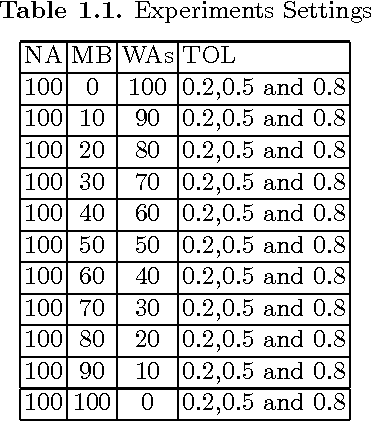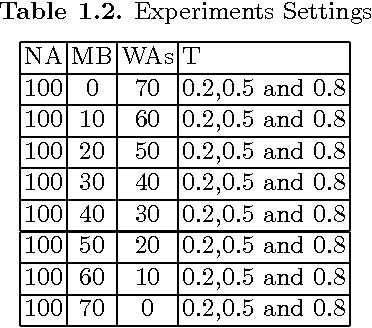Rosaria Conte
Exploiting Reputation in Distributed Virtual Environments
Jun 25, 2011



Abstract:The cognitive research on reputation has shown several interesting properties that can improve both the quality of services and the security in distributed electronic environments. In this paper, the impact of reputation on decision-making under scarcity of information will be shown. First, a cognitive theory of reputation will be presented, then a selection of simulation experimental results from different studies will be discussed. Such results concern the benefits of reputation when agents need to find out good sellers in a virtual market-place under uncertainty and informational cheating.
Understanding opinions. A cognitive and formal account
Jun 21, 2011Abstract:The study of opinions, their formation and change, is one of the defining topics addressed by social psychology, but in recent years other disciplines, as computer science and complexity, have addressed this challenge. Despite the flourishing of different models and theories in both fields, several key questions still remain unanswered. The aim of this paper is to challenge the current theories on opinion by putting forward a cognitively grounded model where opinions are described as specific mental representations whose main properties are put forward. A comparison with reputation will be also presented.
Rooting opinions in the minds: a cognitive model and a formal account of opinions and their dynamics
Jun 21, 2011Abstract:The study of opinions, their formation and change, is one of the defining topics addressed by social psychology, but in recent years other disciplines, like computer science and complexity, have tried to deal with this issue. Despite the flourishing of different models and theories in both fields, several key questions still remain unanswered. The understanding of how opinions change and the way they are affected by social influence are challenging issues requiring a thorough analysis of opinion per se but also of the way in which they travel between agents' minds and are modulated by these exchanges. To account for the two-faceted nature of opinions, which are mental entities undergoing complex social processes, we outline a preliminary model in which a cognitive theory of opinions is put forward and it is paired with a formal description of them and of their spreading among minds. Furthermore, investigating social influence also implies the necessity to account for the way in which people change their minds, as a consequence of interacting with other people, and the need to explain the higher or lower persistence of such changes.
Opinions within Media, Power and Gossip
Feb 11, 2011



Abstract:Despite the increasing diffusion of the Internet technology, TV remains the principal medium of communication. People's perceptions, knowledge, beliefs and opinions about matter of facts get (in)formed through the information reported on by the mass-media. However, a single source of information (and consensus) could be a potential cause of anomalies in the structure and evolution of a society. Hence, as the information available (and the way it is reported) is fundamental for our perceptions and opinions, the definition of conditions allowing for a good information to be disseminated is a pressing challenge. In this paper starting from a report on the last Italian political campaign in 2008, we derive a socio-cognitive computational model of opinion dynamics where agents get informed by different sources of information. Then, a what-if analysis, performed trough simulations on the model's parameters space, is shown. In particular, the scenario implemented includes three main streams of information acquisition, differing in both the contents and the perceived reliability of the messages spread. Agents' internal opinion is updated either by accessing one of the information sources, namely media and experts, or by exchanging information with one another. They are also endowed with cognitive mechanisms to accept, reject or partially consider the acquired information.
 Add to Chrome
Add to Chrome Add to Firefox
Add to Firefox Add to Edge
Add to Edge